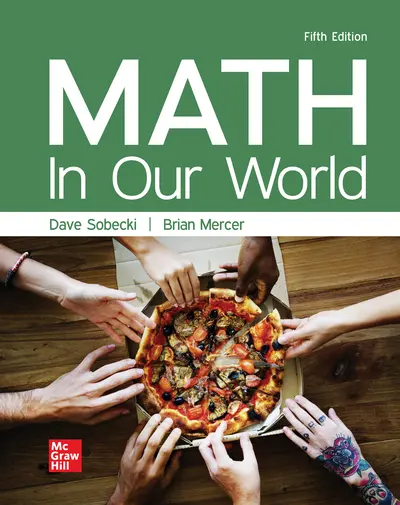David Sobecki
I was born and raised in Cleveland, and started college at Bowling Green State University in 1984 majoring in creative writing. Eleven years later, I walked across the graduation stage to receive a PhD in math, a strange journey indeed. After two years at Franklin and Marshall College in Pennsylvania, I came home to Ohio, accepting a tenure-track job at the Hamilton campus of Miami University. I’ve won a number of teaching awards in my career, and while maintaining an active teaching schedule, I now spend an inordinate amount of time writing textbooks and course materials. I’ve written or co-authored either seven or twelve textbooks, depending on how you count them, as well as several solutions manuals and interactive CD-ROMS.After many years as developmental math coordinator at Miami Hamilton, I share the frustration that goes along with low pass rates in the developmental math curriculum. Far too many students end up on the classic Jetson’s-style treadmill, with the abstract nature of the traditional algebra curriculum keeping them from reaching their goals. Like so many instructors across the country, I believe the time is right to move beyond the one-size-fits-all curriculum that treats students the same whether they hope to be an engineer or a pastry chef. “Because we’ve always done it that way” is NOT a good reason to maintain the status quo in our curriculum. Let’s work together to devise alternate pathways that help students to learn more and learn better while hastening their trip into credit-bearing math courses. Since my book (Math in Our World) is written for the Liberal Arts Math and Quantitative Literacy market, I think I’m in the right place at the right time to make a difference in the new and exciting pathways course.I’m in a very happy place right now: my love of teaching meshes perfectly with my childhood dream of writing. (Don’t tell my publisher this – they think I spend 20 hours a day working on textbooks – but I’m working on my first novel in the limited spare time that I have.) I’m also a former coordinator of Ohio Project NExT, as I believe very strongly in helping young college instructors focus on high-quality teaching as a primary career goal. I live in Fairfield, Ohio with my lovely wife Cat and fuzzy dogs Macleod and Tessa. When not teaching or writing, my passions include Ohio State football, Cleveland Indians baseball, heavy metal music, travel, golf, and home improvement.
Brian A. Mercer
I can say without a doubt that I was made to be in a classroom. I followed the footsteps of my father, a 35-year middle school math teaching veteran, into this challenging yet rewarding career. My college experience began as a community college student at Lakeland College in Mattoon, Illinois. From there, I received a Bachelor of Science in Mathematics from Eastern Illinois University and a Master of Science in Mathematics from Southern Illinois University. I accepted a tenure-track faculty position at Parkland College, where I have taught developmental and college-level courses for 15 years. I had the opportunity to begin writing textbooks shortly after I started teaching at Parkland. My then department chair and mentor, James W. Hall, and I co-authored several textbooks in Beginning and Intermediate Algebra.In the fall of 2011, our department began discussing the idea of creating two tracks through our beginning and intermediate algebra courses. The idea stemmed from two issues. First, most of our beginning and intermediate algebra students were headed to either our Liberal Arts Math or our Introduction to Statistics course. Second, we wanted to beef up intermediate algebra to better prepare those students who were headed to college algebra. These were two competing ideas! Increasing the algebraic rigor of these courses seemed to “punish” students who were not heading to college algebra. With the two track system, we implemented a solution that best serves both groups of students.I have to admit that I was initially concerned that offering an alternate path through developmental mathematics for students not planning to take college algebra would lead to a lowering of standards. However, my participation in our committee investigating this idea led me to believe it was possible to offer a rigorous course that was exceedingly more appropriate for this group of students. Since there were no materials for the course, I began creating my own and was paired by McGraw Hill with Dave Sobecki. Together, we have created the material that I have been using for class testing. After a semester and a half of piloting these materials and seeing the level of enthusiasm and engagement in the mathematical conversations of my students, I am now convinced that this is an ideal course to refine and offer. As a trusted colleague told me, “this is just a long overdue idea.”Outside of the classroom and away from the computer, I am kept educated, entertained and ever-busy my wonderful wife, Nikki, and our two children, Charlotte, 6 and Jake, 5. I am an avid St. Louis Cardinals fan and enjoy playing recreational softball and golf in the summertime with colleagues and friends.
